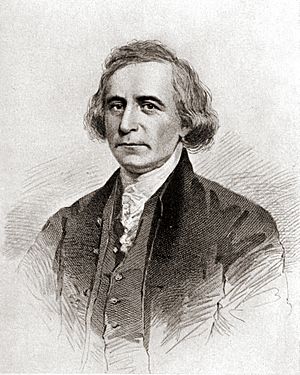Philip Freneau facts for kids
Quick facts for kids
Philip Morin Freneau
|
|
|---|---|
 |
|
| Born | January 2, 1752 New York City, British America |
| Died | December 18, 1832 (aged 80) Matawan, New Jersey |
| Occupation | Poet, writer, polemicist |
| Language | English |
| Nationality | American |
| Alma mater | College of New Jersey (1771) |
| Signature | |
Philip Morin Freneau (born January 2, 1752 – died December 18, 1832) was an important American poet. He was also a sea captain and an early newspaper editor. Some people call him the "Poet of the American Revolution."
Through his newspaper, National Gazette, he often criticized George Washington. Freneau supported the ideas of Thomas Jefferson.
Contents
Philip Freneau's Life Story
Growing Up and School
Philip Freneau was born in New York City. He was the oldest of five children. His father was a wine merchant from France. His mother was from Scotland.
Philip grew up in Matawan, New Jersey. He went to the College of New Jersey, which is now Princeton University. There, he studied with a minister named William Tennent, Jr.
At Princeton, Freneau became good friends with James Madison. This friendship later helped Freneau become a newspaper editor. Freneau graduated from Princeton in 1771.
Starting a Writing Career
After college, Freneau tried teaching for a short time. He also studied to become a minister, but he stopped after two years.
In 1775, as the American Revolution began, Freneau wrote many poems against the British. In 1776, he traveled to the West Indies. There, he wrote about nature. He also wrote about the harsh treatment of enslaved people.
In 1778, Freneau came back to America. He joined the fight for independence. He became a crew member on a privateer ship. This was a ship that attacked British ships.
The British captured Freneau. He was held on a British prison ship for about six weeks. This experience was very difficult for him. He wrote about it in his work The British Prison Ship. This poem led to many more patriotic writings. Because of his strong support for America, he was called "The Poet of the American Revolution."
Newspaper Editor and Politics
In 1790, Freneau married Eleanor Forman. He became an assistant editor for a newspaper in New York. Later, James Madison and Thomas Jefferson asked Freneau to move to Philadelphia. They wanted him to start a newspaper that would support their political ideas.
This new newspaper was called The National Gazette. It was a way for Jefferson and Madison to criticize the Federalist Party. The newspaper often targeted the policies of Alexander Hamilton. It also sometimes criticized President George Washington. Because of these attacks, Washington did not like Freneau.
Later Years and Death
Later in life, Freneau moved to the countryside. He continued to write about politics and nature.
He died at 80 years old. He froze to death while walking home. He was buried in the Philip Morin Freneau Cemetery in Matawan, New Jersey.
Philip Freneau's Impact
Freneau's non-political writings mixed old and new styles of poetry. He introduced many ideas that later became famous through other authors.
For example, his poem "The House of Night" was an early American romantic poem. It used dark and mysterious images. These images later appeared in the poems of Edgar Allan Poe. Freneau's nature poem "The Wild Honey Suckle" (1786) was also very important. It helped start the Transcendentalist movement. This movement was later important to writers like William Cullen Bryant and Henry David Thoreau.
Memorials in Matawan
There are several places in Matawan that remember Philip Freneau:
- The Matawan Post Office has a sculpture of Freneau on its wall. It shows him with enslaved people, as he later became an abolitionist.
- There is a Freneau fire company on Main Street.
- A building Freneau often visited is now a restaurant. From 1961 to 2008, it was called The Poet's Inn.
- Freneau, New Jersey, a small community nearby, is named after him.
In 2022, the band Bird in the Belly used words from Freneau's poem "Pestilence" in their album After the city.
See also
Images for kids
 | William Lucy |
 | Charles Hayes |
 | Cleveland Robinson |


